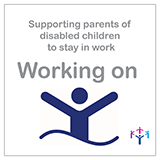By Zara Todd
This is the first time I have ever been asked what it was like being the child of a working parent. I find that interesting because I have spent my entire life as a disabled person being asked questions about myself and my experience. At 28, more aspects of my life have been documented than the majority of people, but the fact that my mother worked has never really come up. I guess, up until this point, people have made the assumption that either my mother didn’t work (I’m from a single parent family) or that my mother’s working has had little effect on my life for good or ill.
Both of these assumptions are wrong. My mum worked full-time from when I was born until I was aged 10 or 11, at which point she took early retirement. While I’m pretty certain that having a disabled child encouraged my mother to retire early, I know that I wasn’t the sole factor in her retirement. Equally, I can’t say that having a working parent had little effect on who I am, what my childhood was like and my relationship with my mum because it has, both positively and negatively.
Having a working parent, regardless of whether you are disabled or not, has an impact because you have to adapt to a wider range of people and to change itself. In my case I was too young to remember when my mum went back to work. It was before my impairment was diagnosed. This is significant because I suspect my mother would have found it much more difficult to find childcare for me had my impairment been known. As it was, as I got older, the harder and harder it was to find childcare because the gap between myself and my non-disabled peers became increasingly significant. A two- or three-year-old using crawling as their major method of transportation is just about acceptable, but when you get to seven or eight people start to worry.
When I was little I had a childminder who I loved to bits and often accidentally called ‘mummy’ and while I can’t really remember much, I look back at that time positively. Unfortunately, between the ages of four and eight I can remember not being very happy that my mummy worked while a lot of the children around me got to spend a lot of time with their parents. I was certainly jealous that many of my classmates didn’t have to go to after-school clubs, work out who they were going to that afternoon or get shop bought cakes for bake sales.
While I had some bad experiences with nurseries and childcare, who were not careful with their charges and did not listen to information (I vividly remember being force-fed meat and fish at the age of four or five because childcare staff didn’t understand what a vegetarian was and thought that I was just being difficult), I also had some good times and remember how proud I was of my mum whenever someone asked me what she did for a living. I don’t feel like I missed out massively because my mum worked but I do sometimes wonder whether my mother feels like she missed out on a lot of my childhood.
I think growing up with a working parent has given me some great skills. I adapt very well to change and enjoy meeting new people. Being in environments where you come into contact with a diverse range of people helped me understand at a very young age that not everybody has the same values, expectations and experiences that my family does. I’d like to think that heavy exposure to new people as a young child has made me a pretty awesome judge of character, and growing up I rarely got homesick. Particularly as a disabled child having a working parent has meant that I had to develop at an early age the ability to explain my condition, what help I needed and what I could and couldn’t do. However, this has just prepared me for adult life where I spent a fair amount of my time having to give the same explanations.
One of the things I found hardest about being a disabled child of a working parent has definitely been seeing and hearing other people judge my mother for her decision to work when she had a ‘severely’ disabled child. My mum would have worked whether I was disabled or not. It was a necessity and a decision I am sure she spent a lot of time agonising over.
It saddens me that many people I’ve come across in my life have judged her for this decision, particularly because of my impairment. In a society which is trying to be inclusive and equal, systems, structures and people should be able to accommodate working parents with disabled children without it being necessary for a parent to give up work.
[This article first appeared in the Winter 2013/14 issue of waving not drowning, the Working Families newsletter for parents and carers of disabled children who work or wish to work, available here.]
